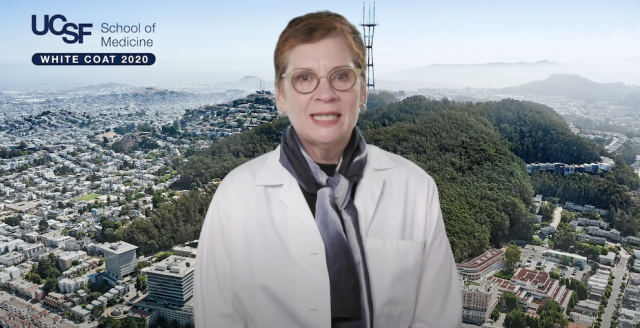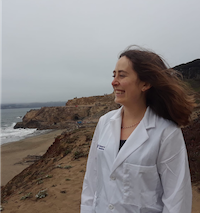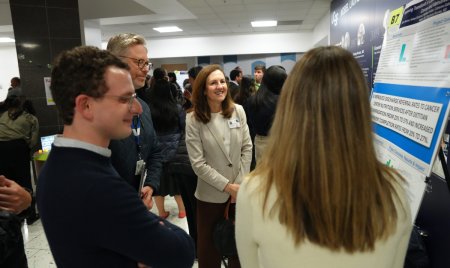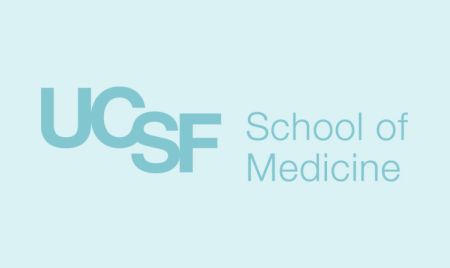A New Generation of Physicians Begin Their Careers in the Middle of a Pandemic

Dr. Catherine Lucey welcomed the new class virtually at the 2020 White Coat Ceremony.
UCSF has prided itself on pushing the boundaries of medicine and society toward positive change for decades. The COVID-19 pandemic has not only underscored the need for this continued change, but has inspired many to push and strive for it. The hope and motivation to create a better society is exemplified by this year’s incoming class of UCSF medical students, who celebrated their transition to becoming student-physicians with a virtual White Coat Ceremony this September.
 While UCSF’s newest class comes from a wide range of backgrounds, with diverse perspectives and passions, they share a common drive to create positive change. Jessica Ma, originally from Atlanta, moved cross-country for medical school for the unique strengths in both primary care and cutting-edge research that UCSF holds. As an undergraduate interested in sexual and reproductive health, Jessica noticed that “every paper on the topic” came from faculty at UCSF, which ultimately motivated her to choose UCSF for her medical education. While many schools emphasized either social justice and advocacy or excellence in biomedical research, Jessica saw UCSF as unique in leading in each domain. Jessica plans to become plugged into advocacy and research in reproductive health, as well as medical education, in her coming years at UCSF.
While UCSF’s newest class comes from a wide range of backgrounds, with diverse perspectives and passions, they share a common drive to create positive change. Jessica Ma, originally from Atlanta, moved cross-country for medical school for the unique strengths in both primary care and cutting-edge research that UCSF holds. As an undergraduate interested in sexual and reproductive health, Jessica noticed that “every paper on the topic” came from faculty at UCSF, which ultimately motivated her to choose UCSF for her medical education. While many schools emphasized either social justice and advocacy or excellence in biomedical research, Jessica saw UCSF as unique in leading in each domain. Jessica plans to become plugged into advocacy and research in reproductive health, as well as medical education, in her coming years at UCSF.
 Like Jessica, Rio Barrere-Cain saw UCSF as the place she could pursue the intersectionality of advocacy with biomedical research. Entering her first year in the combined MD/PhD program, Rio’s passion lies in understanding the molecular mechanisms of epigenetics, in which an individual’s environment influences their gene expression, and ultimately their health. Rio aims to study how social determinants of health impact epigenetics, which may help us to reduce intergenerational health disparities. Like many of her classmates, Rio has already considered the role of physicians outside of the clinic, working with the non-partisan organization VotER, which aims to increase voter participation through interactions in the health care setting. Rio is excited about organizing phone banking to increase voter registration for the November elections.
Like Jessica, Rio Barrere-Cain saw UCSF as the place she could pursue the intersectionality of advocacy with biomedical research. Entering her first year in the combined MD/PhD program, Rio’s passion lies in understanding the molecular mechanisms of epigenetics, in which an individual’s environment influences their gene expression, and ultimately their health. Rio aims to study how social determinants of health impact epigenetics, which may help us to reduce intergenerational health disparities. Like many of her classmates, Rio has already considered the role of physicians outside of the clinic, working with the non-partisan organization VotER, which aims to increase voter participation through interactions in the health care setting. Rio is excited about organizing phone banking to increase voter registration for the November elections.
 Michael Eseigbe joined UCSF to become a physician that, above all else, makes a patient feel cared for. Growing up, Michael saw his mom—a registered nurse—give the best possible care not only to her son, but her patients. Her example led him to volunteer in a cancer ward as a high-schooler, which showed Michael the incredible change he could make in someone’s life. He recalls one patient telling him that Michael was “the only person that made me feel cared for the entire day.” Prior to medical school, Michael served others going through their toughest moments when he spent his gap in the AmeriCorps service, delivering food to underserved individuals with HIV, diabetes, and cancer. If he could make such an immense change in a patient’s life as a volunteer, Michael knew the impact he could have as a physician. He is excited to start his journey in medicine at UCSF, surrounded by other students dedicated to making that impact.
Michael Eseigbe joined UCSF to become a physician that, above all else, makes a patient feel cared for. Growing up, Michael saw his mom—a registered nurse—give the best possible care not only to her son, but her patients. Her example led him to volunteer in a cancer ward as a high-schooler, which showed Michael the incredible change he could make in someone’s life. He recalls one patient telling him that Michael was “the only person that made me feel cared for the entire day.” Prior to medical school, Michael served others going through their toughest moments when he spent his gap in the AmeriCorps service, delivering food to underserved individuals with HIV, diabetes, and cancer. If he could make such an immense change in a patient’s life as a volunteer, Michael knew the impact he could have as a physician. He is excited to start his journey in medicine at UCSF, surrounded by other students dedicated to making that impact.
 While it has been a difficult road to UCSF, Vanessa Mora is more than ready for the challenges ahead. Vanessa watched her parents, who immigrated from Mexico, often work paycheck-to-paycheck to provide her opportunities for education. Vanessa excelled in that education to become a first-generation college graduate, and now medical school, as part of UCSF’s San Joaquin Valley Program in Medical Education program (SJV-PRIME). Following her education, Vanessa will return to the San Joaquin Valley to serve the largely immigrant Latinx community in which she grew up. Vanessa has already seen the common passion of her colleagues in SJV-PRIME, who share her mission to bring healthcare to the undeserved communities in most need.
While it has been a difficult road to UCSF, Vanessa Mora is more than ready for the challenges ahead. Vanessa watched her parents, who immigrated from Mexico, often work paycheck-to-paycheck to provide her opportunities for education. Vanessa excelled in that education to become a first-generation college graduate, and now medical school, as part of UCSF’s San Joaquin Valley Program in Medical Education program (SJV-PRIME). Following her education, Vanessa will return to the San Joaquin Valley to serve the largely immigrant Latinx community in which she grew up. Vanessa has already seen the common passion of her colleagues in SJV-PRIME, who share her mission to bring healthcare to the undeserved communities in most need.
 Elizabeth Picazo, a part of UCSF’s Program in Medical Education for the Urban Underserved (PRIME-US), is the first person in her family to pursue a career in medicine. Yet, she has already seen many ways in which she hopes to improve the healthcare system. Elizabeth witnessed her family endure a number of health conditions and experiences in healthcare while living in San Francisco. Many of these experiences highlighted the disparities in access and outcomes that are far too common in medicine – most recently, her late grandfather’s experience at a hospital in San Francisco. By lacking cultural humility and bedside manner, some members of the healthcare team made an already difficult time more challenging for Elizabeth’s family. At the same time, an incredible group of nurses and social workers made the hospital feel more like a home for Elizabeth and her family. Elizabeth hopes to bring cultural humility and equity in access to healthcare to her future medical career. She looks forward to learning with fellow UCSF students and faculty that “walk-the-walk” in pursuing systematic change, to develop the field of of medicine as one that benefits all patients.
Elizabeth Picazo, a part of UCSF’s Program in Medical Education for the Urban Underserved (PRIME-US), is the first person in her family to pursue a career in medicine. Yet, she has already seen many ways in which she hopes to improve the healthcare system. Elizabeth witnessed her family endure a number of health conditions and experiences in healthcare while living in San Francisco. Many of these experiences highlighted the disparities in access and outcomes that are far too common in medicine – most recently, her late grandfather’s experience at a hospital in San Francisco. By lacking cultural humility and bedside manner, some members of the healthcare team made an already difficult time more challenging for Elizabeth’s family. At the same time, an incredible group of nurses and social workers made the hospital feel more like a home for Elizabeth and her family. Elizabeth hopes to bring cultural humility and equity in access to healthcare to her future medical career. She looks forward to learning with fellow UCSF students and faculty that “walk-the-walk” in pursuing systematic change, to develop the field of of medicine as one that benefits all patients.
The incoming class of UCSF medical students have worked through incredible challenges to get here and become future leaders of an improved healthcare system and society, including entering medical school during the COVID-19 pandemic. Jessica faced the logistic and social challenges of moving cross-country while maintaining social distancing, while Michael and Rio noted the difficulty in finding work-life balance while pursuing remote education. Vanessa acknowledges the difficulty being apart from her parents, and concern for their health as they work in high-exposure jobs. Elizabeth continues to navigate difficult discussions with her family regarding social distancing, and also worries about their health as essential workers.
The community UCSF offers is a common reason this year’s medical class chose UCSF. Cherishing their community of family, friends, and colleagues has helped each student reach this point in their training, and UCSF’s community excites them for the future. At UCSF, this sense of community is paralleled by each student’s faculty “Coach,” who guide students through learning clinical skills and implementing a quality improvement project in the healthcare system throughout their time at UCSF.
Dr. Eric Isaacs is a coach and emergency medicine physician at Zuckerberg San Francisco General Hospital and Trauma Center (ZSFG), who has treated patients with severe cases of COVID-19. He has felt the palpable anxiety of this time within the Emergency Department, but also the hope for positive change held by the students he coaches. In his 26 years at UCSF, coaching has been Dr. Isaacs’s “most satisfying job,” developing the progressive community that makes UCSF unique.
Dr. Kathryn Eubank is also a coach for first-year students, as well as a geriatric hospitalist, and is hopeful this crisis will propel changes such as effective telemedicine for all patients, universal coverage, and reduction in the health disparities she sees in her patients. Drs. Isaacs and Eubank share a hope for the future of medicine – one strongly inspired by the student-physicians receiving their first white coats.
The School of Medicine’s White Coat Ceremony formally welcomed the Class of 2024 in its first ever virtual ceremony, with a keynote address by George Rutherford, MD, Professor of Epidemiology and Biostatistics whose keynote address reflected both on UCSF’s community and its history managing previous pandemics that impacted both the city of San Francisco and the nation.
The School of Medicine thanks Dr. Ramona Tascoe, President of the UCSF Medical Alumni Association, for participating in the White Coat ceremony, and for her support of the class of 2024.









